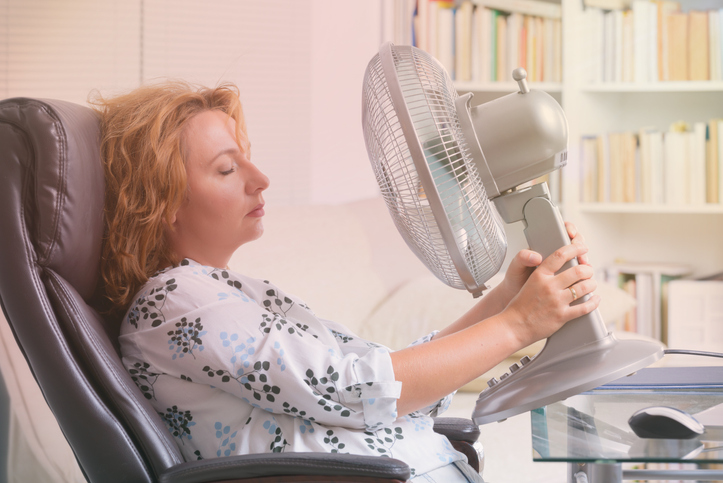Why Hot Flushes Are Not The Only Reason You Sweat
Feeling hot and sweaty is nobody’s idea of fun, but just what might be causing it?

It is a very lucky woman who does not suffer at least a few hot flushes at menopause, and plenty who also experience debilitating night sweats.
There are several reasons for this – one being that plunging oestrogen levels play tricks on the hypothalamus which is the body’s temperature gauge.
No matter how cold it is outside, a hot flush will make your body think you’re in the middle of a heat wave.
In a desperate attempt to shed excess heat, the blood vessels in your skin widen and your sweat glands go into overdrive, leaving you feeling flushed, sweaty, and yearning for a cold shower.
BUT there are plenty of other factors that can bring on a flush and make you sweat.
Hormone imbalance
Let’s start with the one you are most familiar with, and that is the changing levels and surges of hormones from PeriMenopause onwards.
Hormones surging through your body, and a faster metabolic rate, can make you hotter than usual and make your sweat glands more active.
It helps to make sure you drink enough water to keep you hydrated and check your hormone balance for conditions such as oestrogen dominance.
Being stressed, anxious or angry
Most of us are familiar with feelings of high levels of stress and anxiety, and when embarrassment is added to the mix it bring on a sweat.
Emotional stress targets the sweat glands in the palms of your hands and soles of your feet. That’s why it can be uncomfortable to shake hands when you’re nervous.
If you also add anger to that mix, then your body releases stress hormones that boost your heart rate and blood pressure and raise your body temperature, which can lead to sweating.
Finding ways to reduce your stress levels, and keep anger under control, will be important factors in dealing with flushes and sweats.
Illness or infection, and running a temperature
When you’re sick, your brain raises your body’s thermostat a few degrees. You’ll feel cold and have chills as your body tries to make a less welcoming place for germs.
After your fever breaks and your thermostat resets itself to normal, you’ll feel hot and start to sweat and that helps to cool you off to a more normal temperature again.
Infections, diabetes, and an overactive thyroid gland can also open the floodgates. Some diseases, like cancer, tuberculosis and HIV, may cause night sweats.
Food, drink and nicotine
One of the ways to control stress, and deal with oestrogen dominance, can be a specifically related diet that benefits your hormones – see the end of this article.
However, your daily intake of food and drink will make a difference too, and usually that starts with a morning cup of coffee.
It can do more than wake you up as coffee triggers perspiration in two ways: first, caffeine activates the central nervous system, turning on sweat glands so the more caffeine you drink, the more you sweat and the heat from the drink itself can make your body feel hot enough to sweat.
If you are a fan of spicy food, many of those spices can indeed be healthy and good for you, but it fools your body into thinking it’s hot by setting off the same nerve receptors that respond to heat. That’s what can make your tongue sizzle and your face bead up with sweat.
Alcohol is also a major trigger for sweating, and it can often be seen first on the face. It is due to an effect called vasodilation — widening of the blood vessels in the skin.
If you are a regular smoker, then that can increase sweating as nicotine tells your body to release the chemical acetylcholine which turns on your sweat glands. It also raises your heart rate, blood pressure and body temperature.
Nicotine withdrawal also causes excess perspiration, but the health benefits are worth the temporary effect as you will lower your answer to getting cancer, emphysema and many other diseases.
Medication
Though they’re meant to make us feel better, some medicines can cause their own symptoms. Sweating may be a side effect of many drugs, including antidepressants, nonsteroidal anti-inflammatory drugs (NSAIDs), blood pressure medications, cancer treatments, and some diabetes medicines.
If your medication is making you too sweaty, talk to your doctor about changing your dose or looking at other options.
Helpful information:
The majority of hot flushes will respond to progesterone alone, particularly if you are oestrogen dominant, but Night Sweats are a more severe symptom.
It is because they have such a serious impact on your sleep, which in turn has a knock on effect on so many other related systems such as increased stress and anxiety levels.
If that is the case, then a combination of both progesterone and oestrogen will be more effective.
if you think that hormone balance might be an issue, and your diet could do with a few tweaks, then this article will be helpful.
https://anna.blog.wellsprings-health.com/the-diet-to-help-beat-oestrogen-dominance/


















